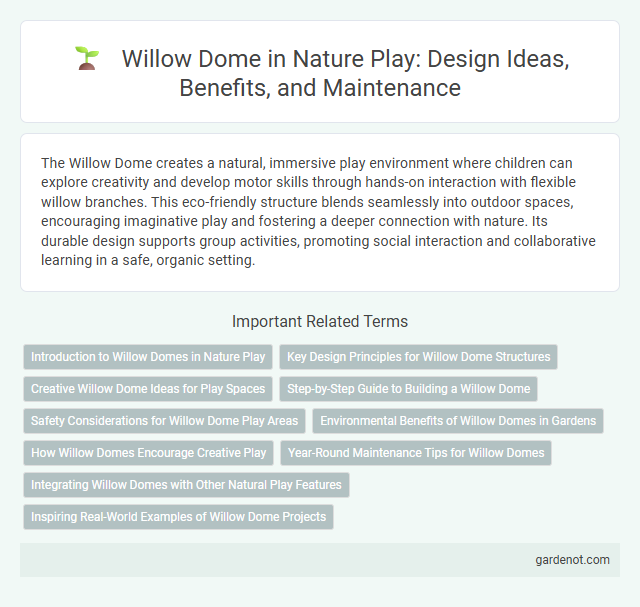The Willow Dome creates a natural, immersive play environment where children can explore creativity and develop motor skills through hands-on interaction with flexible willow branches. This eco-friendly structure blends seamlessly into outdoor spaces, encouraging imaginative play and fostering a deeper connection with nature. Its durable design supports group activities, promoting social interaction and collaborative learning in a safe, organic setting.
Introduction to Willow Domes in Nature Play
Willow domes are natural structures crafted from flexible willow branches woven together to form a cozy, sheltered space that encourages imaginative play and connection with nature. These living play installations support sensory engagement, promote physical activity, and foster environmental awareness in children. Integrating willow domes into nature play areas enhances outdoor learning by creating dynamic, eco-friendly environments that evolve with the seasons.
Key Design Principles for Willow Dome Structures
Willow dome structures emphasize sustainable, natural materials, primarily flexible willow rods woven to create breathable, organic shapes that blend seamlessly with outdoor environments. Key design principles include ensuring structural integrity through tension and compression balance, allowing natural light penetration while providing shelter and fostering interactive play spaces. Attention to environmental impact, seasonal adaptability, and ease of assembly encourages ongoing use and ecological harmony in natural play settings.
Creative Willow Dome Ideas for Play Spaces
Willow domes inspire limitless creativity in nature play spaces, offering a natural shelter that stimulates imaginative role-playing and storytelling. Integrating elements like hanging lanterns, fabric drapes, or natural objects such as pinecones and feathers enhances sensory exploration and tactile engagement. Designing the dome with varying heights and openings encourages active movement and collaborative play, fostering social interaction and cognitive development.
Step-by-Step Guide to Building a Willow Dome
Constructing a willow dome begins with selecting fresh, flexible willow branches approximately 6 to 10 feet long for optimal bending and strength. Start by arranging and firmly planting thicker branches in a circular pattern to form the dome's frame, then weave thinner branches horizontally through the vertical supports to create a sturdy lattice structure. Regularly soak willow branches in water during the building process to maintain flexibility and ensure a durable, natural shelter that promotes immersive nature play.
Safety Considerations for Willow Dome Play Areas
Willow dome play areas require careful safety considerations including regular inspection of structural integrity and removal of sharp branches or protrusions that could cause injury. Ensuring soft, impact-absorbing ground cover beneath the dome minimizes risk from falls, while controlling access points prevents overcrowding and accidental entrapment. Proper maintenance and natural material treatments reduce hazards from decay, pests, and allergens, creating a secure environment for children's imaginative play.
Environmental Benefits of Willow Domes in Gardens
Willow domes enhance gardens by promoting biodiversity through providing habitat for insects, birds, and small mammals, supporting local ecosystems. Their natural materials contribute to carbon sequestration and reduce reliance on synthetic structures, minimizing environmental impact. These living structures also improve soil health by stabilizing the ground and encouraging organic matter decomposition around the root area.
How Willow Domes Encourage Creative Play
Willow domes provide an inviting natural structure that stimulates imaginative scenarios and role-playing among children. Their organic shapes and flexible branches encourage tactile exploration, fostering problem-solving and storytelling skills. By offering an open-ended environment, willow domes nurture creativity and social interaction in outdoor play settings.
Year-Round Maintenance Tips for Willow Domes
Willow dome maintenance requires consistent monitoring of moisture levels to ensure flexible growth and prevent brittleness throughout all seasons. Pruning dead or overgrown branches in early spring promotes structural integrity and encourages renewed growth. Applying organic mulch around the base helps retain soil moisture and protect roots from extreme temperature fluctuations during winter months.
Integrating Willow Domes with Other Natural Play Features
Integrating willow domes with other natural play features like wooden climbing structures, sand pits, and water elements creates a diverse and immersive play environment that encourages exploration and creativity. Combining these features enhances sensory experiences while promoting physical activity, social interaction, and environmental awareness among children. Using native plants and natural materials further enriches the habitat, supporting local biodiversity and offering educational opportunities about ecosystems.
Inspiring Real-World Examples of Willow Dome Projects
Willow dome projects, such as the iconic design at New York's Brooklyn Botanic Garden, showcase natural architecture's ability to blend art with environmental education. These structures use flexible willow branches to create immersive play spaces that foster creativity, sensory development, and a deep connection to nature. Community-driven initiatives in the UK demonstrate how willow domes serve as sustainable, interactive landmarks that promote outdoor learning and ecological stewardship.
Willow dome Infographic

 gardenot.com
gardenot.com